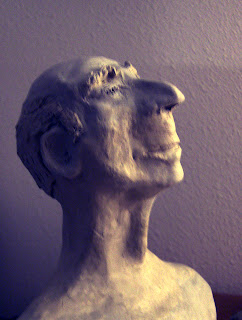
Without an adversary, nothing great would get done. What's left unfinished matters very much in that the desire to finish gets it done. That's why having before us, the unattainable, the impossible, the difficult, the very hard, the greater challenge (name it what you will), that's why it matters and that's why we have adversarial confrontation in nearly everything that's important.
The greater the adversary, the greater is the faith required to overcome it. Faith is the realization that you are not alone, that God exists and is with you. The path down which you walk is not chosen by whim, nor is it there by some random coincidence. For greatness to occur, there must be difficulty in front of you and the difficulty is ALWAYS defined by the nature of your desire.
Otherwise you would not grow.
That's what's missing from the 3-part creed entered below in A Map for Change. I had no mention of the adversary inherent in every growth process. When I wrote it, I knew it came from some one's experience outside my own, that it was some one's statement not my own. It was their idea. I thought about it, thought it worthy to write about; but I had a tough time with it because I knew it wasn't quite that simple.
I dreamt during the night and woke with the title above in my head. I knew as the phrase repeated through the fog of half-sleep that I had hold of something important. I woke myself up quickly, shook my head and threw the blanket back. I grabbed a shirt off the rack and pants from the floor. I put my feet in slippers and came to the keyboard quickly to release this butterfly into the pixel garden before it left.
I knew something was inherently right about the notion. All adversarial confrontation signals something. It means you are on the right track. You wouldn't have the adversary there if you weren't taking the specific steps your desire requires. I wouldn't have the abyss in front of me if I wasn't on the Edge of Awakening. The barrier wouldn't seem so impossible if I wasn't right near a true break through. I wouldn't have the pain if healing wasn't underway.
I broke my back once, and my neck fracturing 4 vertebrae and compressed a fifth. The pain from the injury was a lot and constant. I was in and out of consciousness for quite awhile, but I saw some things in that ethereal place of spirit that assured me the pain was good. I could feel my toes. Lying on my side in the hospital bed, I woke to see my hands in front of me which I opened and closed in pain. Pain saturated my whole body. It felt like I had 80 pounds of crushed rock stuck in my back. Pain was everywhere.
But I was alive and could feel my toes. The first words off my lips were, "Thank you, Father, for the pain. Thank you for the pain, O God! I know what it means." I knew it meant I was going to heal, that He had given me back to life for His good reason, that I was alive by Grace alone and would return to full health in due time. I knew right there I would once again play piano and that I would play with greater freedom, write with more fervor, create with greater creativity--because I was not only alive, but aware of how temporal life is as well.
I knew also that I had not yet finished what matters.
The adversary comes with many faces. Most adversarial conditions in reality have the face of something outside yourself. It might be a mountain, a person, a power in place, a circumstance--might be anything. Only you would know. But here is a most important cue: The nature of all adversary resides within the mind of the one challenged by it. The mountain climber faces fear. The abused faces the abuser, but only in fear. The oppressed face the dictator who rules by fear. The weak and un-achieved face impossibility, but only by fearful conclusion.
The opposite of fear is faith. Faith is knowing that God is with you. If you don't know that yet, you had better get down on your knees and confess your wayward ways, because He is greater than you are. He created you. You are the creation. So humble yourself, then look your adversary in the eye and say to it, "Thank you, Father, for the pain that holds me back, for it draws me closer to You."
That's when faith comes into the heart and that which oppresses the potential is laid down before an open path.






